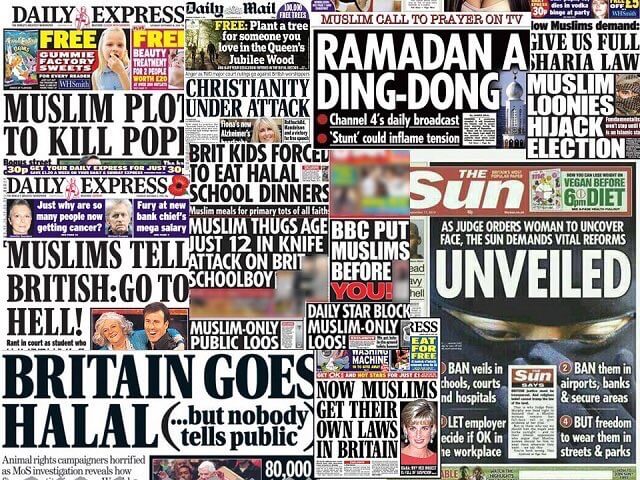A spectre is haunting Europe – the spectre of Sharī’ah?

Getting your Trinity Audio player ready... |
So you ‘think’ you know what Sharī’ah is?
Within Europe and the United States, politicians, thinkers, commentators and a large proportion of the media (mainstream or alternative), have made a concerted effort to depict what they see as being the ‘haunting spectre of Sharī’ah’. Through the relentless repeating of key messages, they have sought to deliberately conjure up several negative images and elicit certain responses from the wider populace whenever the word ‘Sharī’ah’ is mentioned.
لَا إِكْرَاهَ فِي الدِّينِ قَد تَّبَيَّنَ الرُّشْدُ مِنَ الْغَيِّ
There is no compulsion in religion; truth stands out clear from error…
[Qur’ān, 2: 256]
Some of the most common of these images is the idea that it is or is being ‘imposed’ – the ‘imposition of Sharī’ah law’. The use of language is deliberate. It is crafted to highlight ‘the frightening spectre’ that is alleged to be encroaching, taking root, to be eventually imposed upon non-Muslim populations in the West, against their will.
Underlying this outward narrative there is a categorisation of Muslims and a vision of where ‘Islam and it’s Sharī’ah’ should in fact be. Those who have framed this policy approach are the analysts at the Rand Corporation. For well over a decade it has become quite commonplace for politicians and the media to reiterate the ‘Rand vision,’ at times, by repeating it chapter and verse.
By and large, this effort has been particularly effective, in part because it relies upon stoking fear within an audience that is very often too willing to accept what it is told uncritically. Thus the image of the dreaded ‘other’ – the ‘Muslims’ with their ‘unreformed Islam’ and ‘Sharī’ah law’ has now passed into common discourse.
Even many Muslims within Europe, the United States and beyond, shrink into apologetics when such matters are mentioned; seeking to present the ‘nice side’ to Islam while either agreeing or ignoring the narrative and its underlying policy position. And from the shadows, lurking not far away are the comic-book villains who are brought to the limelight in to help bolster these images as and when required.
Another image used is that of barbarity; ‘Sharī’ah law’ being presented as being the antithesis to modernity, representing a retreat from ‘reason and enlightenment’ into the clutches of a best forgotten dark ages. Epitomising this, is the banning of alcohol and forcing all women to wear the ‘burqa’. Lastly, there is the matter of punishment. Whether that is flogging, stoning, or even as some like to insist upon, throwing people off mountains and buildings.
It is not always easy to take a step back from all of this and try to critically evaluate it. Yet this is necessary, because the entire narrative is nothing but an inversion of truth. The very same people promoting or parroting the narrative would have us all believe that the crimes carried out under the guise of the fight or war against terrorism should be relegated into second place, or even worse, not subject to critical appraisal.
Let us therefore unpick some of the major themes that the narrative either deliberately distorts and tries to misinform.
The word ‘Sharī’ah’
It isn’t possible to translate the word Sharī’ah into a single all-encompassing equivalent term in English. The reason being, is that there isn’t a direct corresponding word in English that carries the exact same meaning. The word in Arabic stems from three root-letters [sha/ra/a’– ش/ر/ع] and it appears along with its derivatives in several Qur’ānic verses:
لِكُلٍّ جَعَلْنَا مِنكُمْ شِرْعَةً وَمِنْهَاجًا
for every one of you did We appoint a law and a way…[5: 48]
ثُمَّ جَعَلْنَاكَ عَلَىٰ شَرِيعَةٍ مِّنَ الْأَمْرِ فَاتَّبِعْهَا وَلَا تَتَّبِعْ أَهْوَاءَ الَّذِينَ لَا يَعْلَمُونَ
Then We have made you follow a course in the affair, therefore follow it, and do not follow the low desires of those who don’t know. [45:18]
أَمْ لَهُمْ شُرَكَاءُ شَرَعُوا لَهُم مِّنَ الدِّينِ مَا لَمْ يَأْذَن بِهِ اللَّهُ
Or have they partners who have prescribed for them any Deen that Allah does not sanction? [42: 21]
Strictly speaking, the use of the word ‘law’ in translation doesn’t always convey the full remit of what the Sharī’ah is. Figuratively, it is the divinely revealed way, the path of guidance from God (Allah). Writing in his compendium of definitions (Kashsāf Iṣṭilāḥāt al-Fanun), Muḥammad at-Tahānawi put forward the following explanation:
Sharī’ah means the commands given by God to his servants, which have been brought by any of the Prophets, peace be upon them and our Prophet. It is all the same whether they relate to the manner of action – and this is known as subsidiary and applied law – to which the science of Fiqh (jurisprudence) was developed; or they relate to the manner of belief (al-I’tiqād), and this is known as the essentials for which the science of theology (‘ilm al-Kalam) was developed.
Broadly speaking modern legal systems delineate the parameters of what is judged to be lawful and unlawful. Sanctions are attached to specific breaches of that which is deemed to be unlawful. Precisely how an individual in society should lead their life, upon what ethical or moral basis, is (allegedly) left to the individual’s choice – in reality though, the modern nation-state does in fact shape that considerably. The Sharī’ah encompasses that and more, its scope extending far beyond a simplified meaning of law as is understood in common parlance. In his magum opus the book of monotheism, Professor Muḥammad al-Mas’ari writes:
“…Deen – in the eyes of the people of Islam – is not simply limited solely to pure ritualistic acts of worship, metaphysical beliefs or even beautiful manners and general morality as it is within the Western conception of religion. In fact, it relates to all voluntary human acts upon which a legal Sharī’ah judgment (ḥukm sharī’) is made, whether:
- it is intended as being pure worship; drawing closer to Allah in order to achieve a particular spiritual, devotional or ascetic value, such as through the devotional acts of worship associated with prayer, remembrance and supplication.
- Or intended to achieve a congenital ethical value, like being honest, generous and even considerate to animal welfare
- Intended as achieving a humanitarian value, such as helping others suffering from loss, like in war or in natural disasters; saving someone from drowning regardless of race, colour or religion etc.
- People seek to gain a greater moral standing, by praise or glory
- Wanting to obtain a material benefit such as a monetary one obtained by payment or trade.”
The legal rules, described as ‘al-Aḥkām al-Sharī’ah’, place the categorisation of human actions into the following framework:
- Obligated (wājib, farḍ)
- Prohibited (ḥarām)
- Permissible (mubaḥ)
- Recommended (mustaḥab, often colloquially called Sunnah)
- Disliked (makruḥ)
As noted, while there are rules that the Sharī’ah delineates as being the obliged/ordered and prohibited, there are also categorisations that have no modern legal parallel.
Deriving the legal rules
‘Al-Aḥkām al-Sharī’ah’ – hasn’t come in the form of a finalised manual or a formatted legal document. Rather it mandates human effort to extract the rulings from the sources. The ‘legal’ sources are the revelation: the Qur’ān and the Prophetic Sunnah. The latter being comprised of the authentically reported statements, acts and approvals of the Prophet Muḥammad (peace and blessings be upon him and his family).
There is an enormous corpus of jurisprudence (Fiqh) and works relating to the methodology and foundational principles that are used to deduce and extract that jurisprudence from its sources (Uṣul al-Fiqh). It is a travesty that the present narrative seeks to dismiss more than a millennium of scholarship, reducing the Sharī’ah to a few rules – and even in that, they are not depicted accurately.
The scope of ‘Sharī’ah’
Globally, Muslims – wherever they are, already adhere to and implement many Islamic legal rulings (Aḥkām Sharī’ah). For a Muslim, namely, one who pronounces the two testimonials of faith, there isn’t a pick and choose option. In other words, they are required to perform the requisite obligations and refrain from the prohibitions as they have accepted and submitted to the message of Islam. That position is clearly set out textually in the Qur’ān [see 33: 36].
When referring to the imagined idea that ‘Sharī’ah is being imposed’, either in abstract or specifically upon non-Muslims the narrative would never argue that this imposition requires:
- 2.5% of saved wealth to be given annually to, amongst others, the poor, the needy, orphans or the indebted
- An outright prohibition on spying, mass-surveillance, the circulation of false rumours and suspicion
- A duty to be respectful, kind and courteous to one’s parents
- Not to accept or pay bribes
Yet each of the points listed (i) to (iv) are well-established Islamic rulings that are enshrined within the Aḥkām Sharī’ah. Furthermore, regardless of sect, school of thought, or s

piritual persuasion, no Muslim would reasonably seek to dispute that any of these points are textually established beyond doubt.
However, it is much easier to appeal to prejudices that have been nurtured, fostered and consistently played upon. What isn’t mentioned is that these rulings and others apply to Muslims. Islam is a universal and comprehensive way of life and the final Messenger and seal of the Prophets, Muḥammad bin Abdallah (peace and blessings be upon him and his family),
was sent with this message to all of mankind. But one must voluntarily embrace Islam first before implementing and applying the Aḥkām Sharī’ah.
Given this, the phantasm of an imposed or encroaching Sharī’ah is a serious misnomer. There is no requirement for a non-Muslim women to wear the ḥijab or that the Aḥkām Sharī’ah would or could be ‘imposed’ to make them do so. In fact, the verses which set out this requirement clearly restrict it to Muslim women: ‘O Prophet, say to your wives and your daughters and the women of the believers…’ [33: 59] as well as ‘…and say to the believing women…’ [24: 31]. The ‘compulsory veiling’ of journalists, tourists, or at times dignitaries in places such as the Gulf, Iran or even Afghanistan as a ‘requirement of Sharī’ah law’ is thus complete nonsense. While those countries and others may make many statements concerning ‘Sharī’ah law’, their constitutional, political and economic realities are a far cry from it.
‘Dreaded’ punishments
Arguably this is one area that has proved to be the most controversial and one that the narrative seeks to keep in the forefronts of people’s minds. The practice of Muslim majority countries hasn’t helped this matter either. Indeed, those countries that claim to apply Sharī’ah, in fact do so in name only, misapplying a small collection of rules very badly. While corporal punishments are carried out in Saudi Arabia, Iran and even Indonesia, they are not correctly applied. They cannot exist outside of the framework of a legitimately constituted Islamic authority. The idea that once corporal punishment has been implemented, ‘the Sharī’ah has arrived,’ is one of the most insidious ideas to have bedevilled Muslims over the last 50 or so years. Corporal punishment is not seen as being one potential outcome as part of an elaborate end-to-end process, but in many minds unfortunately, it is the process itself.
One aspect that is never mentioned is what the Aḥkām Sharī’ah stipulates concerning the issue of homicide. Whether one looks at the works of jurisprudence (fiqh) or the corpus of Prophetic Sunnah (books of ḥadith), this topic isn’t dealt with under the subject heading of punishments. Rather, it is dealt with under the heading of Qiṣāṣ, which is often translated as being retaliation or retribution. If it is established beyond reasonable doubt that someone is guilty of the offence of homicide, then the Aḥkām Sharī’ah stipulates the final sentencing outcome be determined not by a judge, but the victim’s next of kin. They may request one of three-options:
- To seek retribution, a life for a life (capital punishment)
- To be financially compensated (diya)
- Pardoning the culprit by granting them forgiveness
No present legal system on earth affords these options for an outcome of justice.
Perhaps most controversially of all, at least for people in Europe and the United States, is the what the Aḥkām Sharī’ah allegedly stipulates concerning the punishment for homosexuality. Rather peculiarly, this issue seems to have been seized upon by a section of the alternative, right-leaning media. In line with the overall narrative, they would argue that the punishment of stoning, throwing homosexuals of buildings, burying them under rumble etc. demonstrates that Islam itself is not a religion, but rather a death-cult. One that is simply incompatible with any sense of modernity.
Homosexuality has existed since time immemorial. It exists both in open societies as well as closed societies. No monotheistic religion, Islam included, regards homosexuality as being a praiseworthy practice or lifestyle. The Aḥkām Sharī’ah designates it to be a major sin. Ultimately, Islam holds that there is to be a life beyond the present one and that there will be a final day of reckoning where all matters, including this, will be finally determined.
When looking at the works of Islamic jurisprudence upon this very issue, it is noted that it is in fact quite a complex issue. In order to show just how complex this is, as well as deconstructing the falsity of these alleged punishments, we present for the first time in English, a complete translation of ‘Issue no. 2303’ from the Muḥalla by the acclaimed jurist of Muslim Spain, Ibn Ḥazm.
Rule by Islam
There have been several epochs in Islamic history and several dynastical ruling periods. Arguably the most famous have been the ‘Abbasids, the Ummayads of Span, the Mughals in India and the last of them, the Ottomans. Each of these epochs were not without their given problems. While there were many accolades, there was also many troubles. It would therefore be incorrect to assert that rule by Islam is or in fact was exemplified by each of these periods.
Classical Muslim jurists would be astounded at the breadth of authority that the modern-nation state has accrued. When commenting upon the nature of political ruling, their conception of the extent of political authority was extremely limited. Beyond about a dozen clear legal responsibilities, power wasn’t conceived as being rooted in centralisation, but rather decentralisation.
Yet, even they were unable to pull together all existing material to develop a truly comprehensive theory of rule or political authority. That task, has been bequeathed to us.
The blueprint for what rule by Islam is and how it should be, can only be determined by the revelatory texts, the Qur’ān and the Prophetic Sunnah. How that should be translated into actuality, was demonstrated by none other than the Prophet (peace be upon him) himself. He (peace be upon him) even had codified a document for the city of Medina – referred to as Ṣaḥeefa-tul-Madina (the constitution or charter of the city of Medina). Self-rule, particularly for non-Muslims was enshrined; that point even being continued under the era of his successors.
Contemporary Challenges
In addition to combating the ‘narrative’, one key issue facing Muslim today is to glean the Prophetic example from Medina together with the textual sources as a whole and properly codify them as a legal constitution. Consequently, there shouldn’t be any resort to the warped idea of ‘the lesser evil’, which is nothing more than sophism marshalled to support an unjust status quo, but a radical departure from contemporary views of how politics and statecraft is to be conducted
Suffice is to say here, is that the model that the Prophet (peace be upon him) instituted was perhaps more akin to a confederation of peoples under an Islamic umbrella. Notable features of this understanding of how rule by Islam would operate would be:
- a system that embodies the Qur’anic principles of Shura’ (consultative deliberation) and justice; where power is not increasingly concentrated at the centre, but rather diffused and devolved down.
- a confederacy where religious minorities are given full legal protection and self-governance
- an economic model where the idea of debt-slavery is eradicated, since the Islamic texts do not sanction the use of usury nor that of a fiat-currency.
Research into these points are currently ongoing and it is our intention to have the substantive work(s) on this topic fully translated and presented to our readership in due course.
Fear, prejudice and deception will and can never be a substitute for knowledge.
ادْعُ إِلَىٰ سَبِيلِ رَبِّكَ بِالْحِكْمَةِ وَالْمَوْعِظَةِ الْحَسَنَةِ وَجَادِلْهُم بِالَّتِي هِيَ أَحْسَنُ إِنَّ رَبَّكَ هُوَ أَعْلَمُ بِمَن ضَلَّ عَن سَبِيلِهِ وَهُوَ أَعْلَمُ بِالْمُهْتَدِينَ
Invite to the way of thy Lord with wisdom and beautiful preaching; and argue in ways that are best and most gracious: for thy Lord knows best, who has strayed from his path and who receives guidance.
[Qur’ān, 16: 125]




